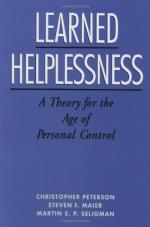|
This section contains 757 words (approx. 3 pages at 300 words per page) |

|
The term learned helplessness is used to refer to any behavioral or physiological consequence of exposure to an aversive event that is produced not by the event itself but by the organism's lack of behavioral control over the event. By behavioral control is meant the organism's ability to alter the onset, termination, duration, intensity, or temporal pattern of the event. If the event (e.g., a loud noise, a painful electric shock, an attack by another animal or person) can be altered by some behavioral response, then the organism has some control over the event. If there is nothing that the organism can do to change the event, then the event is uncontrollable.
This concept has been studied using an experimental paradigm called the triadic design. Here one subject, say a rat, is given control over the event, say a mild electric shock, delivered to the...
|
This section contains 757 words (approx. 3 pages at 300 words per page) |

|


